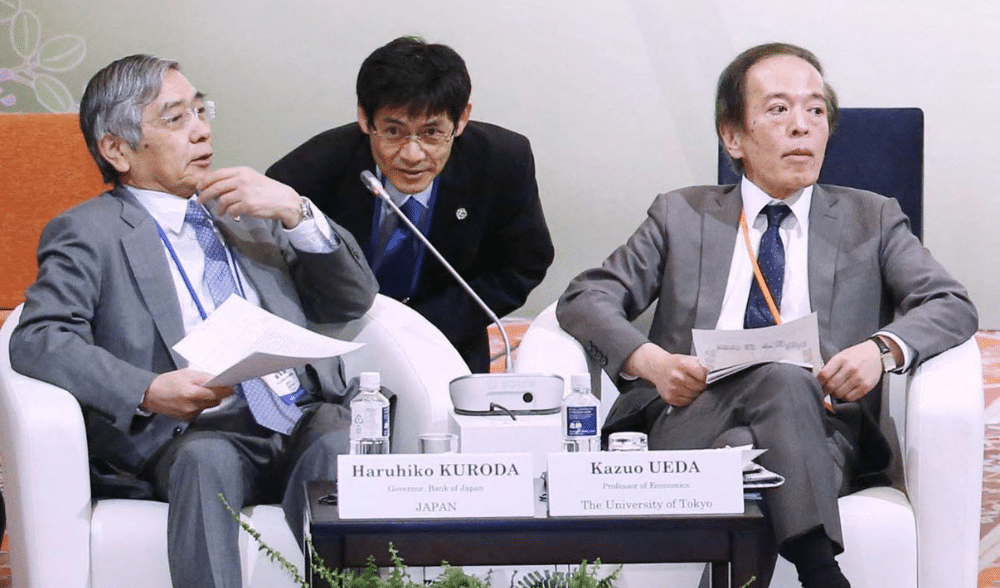SAM BECK WRITES – Japan’s Prime Minister Fumio Kishida has named a new potential Governor of the world-renowned Bank of Japan, MIT Ph.D and former BOJ board member Kazuo Ueda.
Dilemmas that faced incumbent Governor Haruhiko Kuroda, whose decade-long term ends in April, led to the announcement on February 14.
What happened? Kuroda’s and the BOJ’s unwillingness to raise interest rates amid a seemingly unified global response to inflation have slowly endangered the Japanese economy, and have at the very least become a talking point for critics and supporters. “When he finishes up in April he’ll have been governor for ten years, so I think you have to periodize any evaluation of Kuroda,” says political scientist and professor at Loyola Marymount University Gene Park. “His unconventional monetary policies actually improved the labor market, Japan stably and predictably got out of deflation… What he did not achieve was hitting his self-declared 2% inflation target.”
Kuroda’s decision, among others, act contrary to conventional economic theory, which (if you don’t mind a brief review in economics) maintains that in order to buttress inflation, a Fed must increase interest rates to decrease national spending. In turn, this renders an eventual drop in the price of goods. Once a country gets the price of goods back down to an acceptable range, it can drop interest rates and get people spending again. This game of balance is foundational to economics.
So why not just raise rates? Theory is much different than practice. Japan’s dependence on low-interest loans and the variable-rate-mortgage nature of its real estate market create disincentives to change current monetary policy, which actually elucidates a tough problem for Tokyo. If the BOJ spikes interest rates to curb spending and boost the value of the Yen, loan and property payments will soar and Japanese homes and businesses will be adversely affected – not to mention the extreme plunge of the global economy during Covid-19.
“The majority of what is causing inflation has nothing to do with the monetary policies of Kuroda and so much of it has to do with the pandemic,” continues Park. Rising global interest rates have not only devalued the Yen but lowered demand for Japanese goods, rendering a shock to the export market. Park’s words about periodization are vital to the discourse surrounding Kuroda and the hand-off of the BOJ, but only so much so.
It’s interesting to note that out of all major economies, Japan has the lowest inflation rate. This would render opposing claims invalid, except when juxtaposed against the fact that Japan’s GDP hasn’t grown since 2016 , when the BOJ implemented its YCC (Yield Curve Control) monetary policy, long before Covid. Compare this with the US and China , which have both respectively jumped 6 trillion annually since then. No wonder the other two superpowers are having to raise their own interest rates.
We know Ueda was selected for a reason: Specifically, because he is not someone with a background in finance. He’s an academic and economist, known for his cerebral nature, someone who is still a close consultant of current BOJ executives after having served on its board from 1998-2005. He actually had a hand in influencing the easy-money economic strategy that the BOJ has been employing. He’s currently head of the bank’s academic institute, dean of the business school at Kyoritsu Women’s University in Tokyo, and external director of JGC Holdings Corp.
The question becomes, if Ueda is someone who helped form Japan’s current monetary policy… the policies that aren’t working… how will he see Japan out of its nasty predicament? When he referred to the institution’s failing strategy as “appropriate”, the heuristic ‘You can’t solve a problem with the same thinking that created it’ began to loom over the nomination.
Contrarily, radical opposition to even-tempered fiscal policy hasn’t proven marginally healthy for Japan, or for BOJ leaders, either. Former prime minister Shinzo Abe’s investment-heavy stimulus project “Abenomics pushed government debt to over 200% of GDP” brought Japan’s inflation rate to 4% (which is double its annual goal and the highest it’s been since 1991).
It’s possible that this background is exactly why, of all the expected names to be pulled from the BOJ’s hat, Ueda’s was chosen. He’s watched the mistakes of the last few administrations; he’s not so opposed to the current system enough as to make massive tweaks; he believes in aspect of that system but is willing to work within it to address Japan’s problems in a calculated manner.
“The Japanese economy has had negative shocks from global slowdowns this year. So it’s not the time to increase interest rates,” says Keio University Professor of Economics Sayury Shirai. “He may delay the timing to do an exit policy…”
Ueda’s words in last week’s address to the Japanese press echo this, noting that any change of course while he’s at the helm will be incremental. He’ll need to address the value of the Yen, the depreciation of which has fallen on the backs of Japan itself. And he’ll need to be unprecedentedly creative about the solution, because a lack of due consideration to achieve economic normalization could make things worse. With the ethos around his name solid as well as associates confident and faithful in his ability, Ueda may well be ushered in after April 8th when Kuroda’s term ends. Parliamentary hearings to deliberate Ueda’s views and goals begin February 24th, and it’s anyone’s guess what his pitch for the BOJ’s next steps will be.

